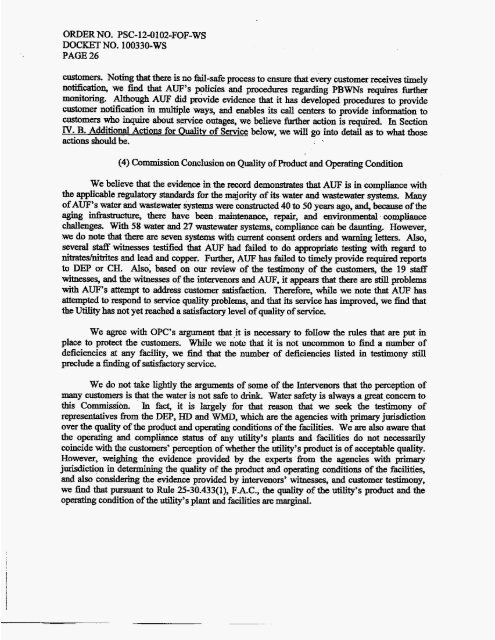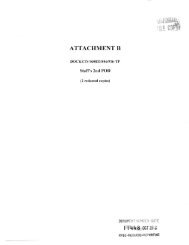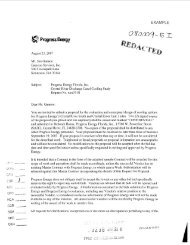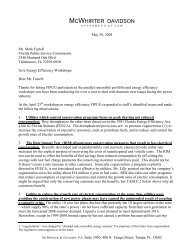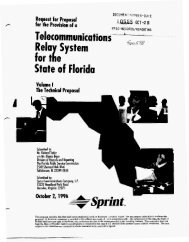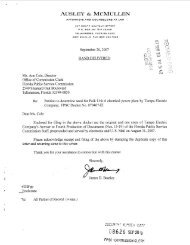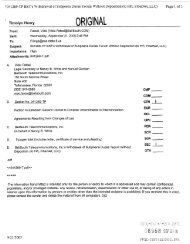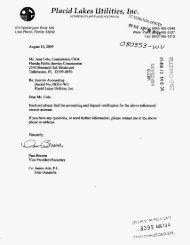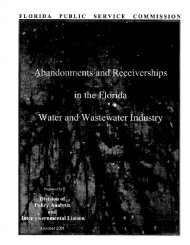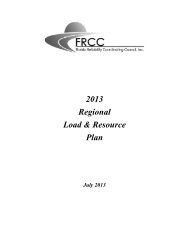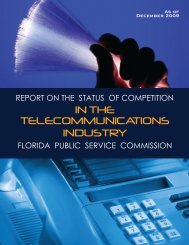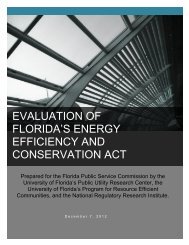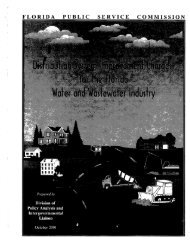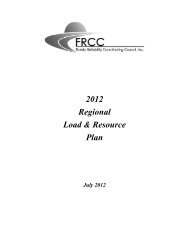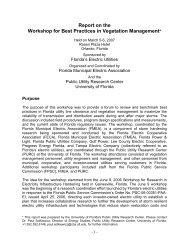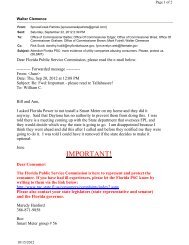- Page 1 and 2: MIKE HARIDOPOLOS President of the S
- Page 4 and 5: CERTIFICATE OF SERVICE I hereby cer
- Page 6 and 7: Wastewater Rates and Requiring Refu
- Page 8 and 9: ATTACHMENT A
- Page 10 and 11: ORDER NO. PSC-12-0102-FOF-WS DOCKET
- Page 12 and 13: ORDER NO . PSC-12-0102-FOF-WS DOCKE
- Page 14 and 15: ORDERNO. PSC-12-0102-FOF-WS DOCKETN
- Page 16: ORDER NO. PSC-12-0102-FOF-WS DOCKET
- Page 19 and 20: ORDER NO. PSC-12-0102-FOF-WS DOCKET
- Page 21 and 22: ORDER NO. PSC-12-0102-FOF-WS DOCKET
- Page 23 and 24: ORDER NO. PSG12-0102-FOF-WS DOCKETN
- Page 25 and 26: ORDERNO. PSC-12-0102-FOF-WS DOCKETN
- Page 27 and 28: ORDERNO. PSC-12-0102-FOF-WS DOCKET
- Page 29 and 30: ORDERNO. PSC-12-0102-FOF-WS DOCKETN
- Page 31 and 32: ORDER NO. PSC-12-0102-FOF-WS DOCKET
- Page 33: ORDERNO. PSC-124102-FOF-WS DOCKETNO
- Page 37 and 38: ORDDNO. PSC-12-0102-FOF-WS DOCKETNO
- Page 39 and 40: ORDERNO. PSC-12-0102-FOF-WS DOCKET
- Page 41 and 42: ORDER NO. PSC-124102-FOF-WS DOCKET
- Page 43 and 44: ORDFR NO. PSC-12-0102-FOF-WS DOCKET
- Page 45 and 46: ORDER NO. PSC-12-0102-FOF-WS DOCKET
- Page 47 and 48: ORDER NO. PSC- 12-0102-FOF-WS DOCKE
- Page 49 and 50: ORDER NO. PSC-12-0102-FOF-WS DOCKET
- Page 51 and 52: ORDERNO. PSC-12-0102-FOF-WS DOCKET
- Page 53 and 54: ORDER NO. PSC-12-0102-FOF-WS DOCKET
- Page 55 and 56: ORDERNO. PSC-12-0102-FOF-WS DOCKETN
- Page 57 and 58: ORDER NO. PSC-12-0102-FOF-WS DOCKET
- Page 59 and 60: ORDERNO. PSC-12-0102-FOF-WS DOCKETN
- Page 61 and 62: ORDER NO. PSC-12-0102-FOF-WS DOCKET
- Page 63 and 64: ORDER NO. PSC-12-0102-FOF-WS DOCKET
- Page 65 and 66: ORDER NO. PSC-12-0102-FOF-WS DOCKET
- Page 67 and 68: ORDERNO. PSC-12-0102-FOF-WS DOCKETN
- Page 69 and 70: ORDER NO. PSC-12-0102-FOF-WS DOCKET
- Page 71 and 72: - ORDER NO. PSC-12-0102-FOF-WS DOCK
- Page 73 and 74: ORDER NO. PSC-12-0102-FOF-WS DOCKET
- Page 75 and 76: ! ORDERNO. PSC-12-0102-FOF-WS DOCKE
- Page 77 and 78: ORDER NO. PSC-12-0102-FOF-WS DOCKET
- Page 79 and 80: ORDERNO. PSC-124102-FOF-WS DOCKETNO
- Page 81 and 82: ORDER NO. PSC-12-0102-FOF-WS DOCKET
- Page 83 and 84: ORDER NO. PSC-12-0102-FOF-WS DOCKET
- Page 85 and 86:
ORDER NO. PSC-12-0102-FOF-WS DOCKET
- Page 87 and 88:
ORDER NO. PSC-12-0102-FOF-WS DOCKET
- Page 89 and 90:
ORDER NO. PSC-12-0102-FOF-WS DOCKET
- Page 91 and 92:
ORDER NO. PSC-12-0102-FOF-WS DOCKET
- Page 93 and 94:
ORDFX NO. PSC-12-0102-FOF-WS DOCKET
- Page 95 and 96:
ORDER NO. PSC-12-0102-FOF-WS DOCKET
- Page 97 and 98:
ORDERNO. PSC-12-0102-FOF-WS DOCKETN
- Page 99 and 100:
ORDERNO. PSC-12-0102-FOF-WS DOCKET
- Page 101 and 102:
ORDER NO. PSC-12-0102-FOF-WS DOCKET
- Page 103 and 104:
ORDER NO. PSC-12-0102-FOF-WS DOCKET
- Page 105 and 106:
ORDER NO. PSC-12-0102-FOF-WS DOCKET
- Page 107 and 108:
ORDER NO. PSC-12-0102-FOF-WS DOCKET
- Page 109 and 110:
ORDER NO. PSC-12-0102-FOF-WS DOCKET
- Page 111 and 112:
ORDER NO. PSC-12-0102-FOF-WS DOCKET
- Page 113 and 114:
ORDER NO. PSC-124102-FOF-WS DOCKETN
- Page 115 and 116:
ORDER NO. PSC-12-0102-FOF-WS DOCKET
- Page 117 and 118:
ORDER NO. PSC-12-0102-FOF-WS DOCKET
- Page 119 and 120:
ORDER NO. PSC-12-0102-FOF-WS DOCKET
- Page 121 and 122:
ORDER NO. PSC-12-0102-FOF-WS DOCKET
- Page 123 and 124:
ORDER NO. PSC-12-0102-FOF-WS DOCKET
- Page 125 and 126:
ORDER NO. PSC-12-0102-FOF-WS DOCKET
- Page 127 and 128:
ORDER NO. PSC-12-0102-FOF-WS DOCKET
- Page 129 and 130:
ORDER NO. PSC-12-0102-FOF-WS DOCKET
- Page 131 and 132:
ORDER NO. PSC-12-0102-FOF-WS DOCKET
- Page 133 and 134:
ORDER NO. PSC-12-0102-FOF-WS DOCKET
- Page 135 and 136:
ORDER NO. PSC-12-0102-FOF-WS DOCKET
- Page 137 and 138:
ORDER NO. PSC-12-0102-FOF-WS DOCKET
- Page 139 and 140:
ORDER NO. PSC-12-0102-FOF-WS DOCKET
- Page 141 and 142:
ORDER NO. PSC-12-0102-FOF-WS DOCKET
- Page 143 and 144:
ORDER NO. PSC-12-0102-FOF-WS DOCKET
- Page 145 and 146:
ORDERNO. PSC-12-0102-FOF-WS DOCKET
- Page 147 and 148:
ORDER NO. PSC-12-0102-FOF-WS DOCKET
- Page 149 and 150:
ORDER NO. PSC-12-01 02-FOF-WS DOCKE
- Page 151 and 152:
ORDERNO. PSC-12-0102-FOF-WS DOCKET
- Page 153 and 154:
ORDER NO. PSC-12-0102-FOF-WS DOCKET
- Page 155 and 156:
ORDERNO. PSC-12-0102-FOF-WS DOCKETN
- Page 157 and 158:
ORDER NO. PSC-12-0102-FOF-WS DOCKET
- Page 159 and 160:
ORDER NO. PSC-12-0102-FOF-WS DOCKET
- Page 161 and 162:
ORDER NO. PSC-12-0102-FOF-WS DOCKET
- Page 163 and 164:
ORDER NO. PSC-12-0102-FOF-WS DOCKET
- Page 165 and 166:
ORDER NO. PSC-12-0102-FOF-WS DOCKET
- Page 167 and 168:
ORDER NO. PSC-12-0102-FOF-WS DOCKET
- Page 169 and 170:
ORDER NO. PSC-12-0102-FOF-WS DOCKET
- Page 171 and 172:
ORDER NO. PSC-12-0102-FOF-WS DOCKET
- Page 173 and 174:
ORDER NO. PSC-124102-FOF-WS WCKETNO
- Page 175 and 176:
ORDER NO. PSC-12-0102-FOF-WS DOCKET
- Page 177 and 178:
I I ORDERNO. PSC-12-0102-FOF-WS DOC
- Page 179 and 180:
ORDER NO. PSC-12-0102-FOF-WS DOCKET
- Page 181 and 182:
ORDER NO. PSC-12-0102-FOF-WS DOCKET
- Page 183 and 184:
ORDER NO. PSC-12-0102-FOF-WS DOCKET
- Page 185 and 186:
ORDER NO. PSC-12-0102-FOF-WS DOCKET
- Page 187 and 188:
4 i ORDER NO. PSC-12-0102-FOF-WS DO
- Page 189 and 190:
ORDER NO. PSC-12-0102-FOF-WS DOCKET
- Page 191 and 192:
COST OF CAPITAL PAA ISSUE 16: STIPU
- Page 193 and 194:
ORDER NO. PSC-12-0102-FOF-WS DOCKET
- Page 195 and 196:
ORDER NO. PSC-12-0102-FOF-WS DOCKET
- Page 197 and 198:
ORDER NO. PSC-12-0102-FOF-WS DOCKET
- Page 199 and 200:
ORDERNO. PSC-12-0102-FOF-WS DOCKETN
- Page 201 and 202:
ORDER NO. PSC-12-0102-FOF-WS DOCKET
- Page 203 and 204:
ORDER NO. PSC- 12-0 1 02-FOF- WS DO
- Page 206 and 207:
ORDER NO. PSC-12-0102-FOF-WS DOCKET
- Page 208 and 209:
ORDER NO. PSC-12-0102-FOF-WS DOCKET
- Page 210 and 211:
ORDER NO. PSC-12-0102-FOF-WS DOCKET
- Page 212 and 213:
ORDER NO. PSC-12-0102-FOF-WS DOCKET
- Page 214 and 215:
ORDER NO. PSC-124102-FOF-WS DOCKET
- Page 216 and 217:
ORDERNO. PSC-12-0102-FOF-WS DOCKETN
- Page 218 and 219:
1 2 1 2 3 4 5 6 7 8 1 2 3 4 1 2 3 4
- Page 220 and 221:
ORDER NO. PSC-12-0102-FOF-WS DOCKET
- Page 222 and 223:
ORDER NO. PSG12-0102-FOF-WS DOCKETN
- Page 224 and 225:
ORDER NO. PSC-12-0102-FOF-WS DOCKET
- Page 226 and 227:
1 2 1 2 3 4 5 6 7 8 1 2 3 4 ORDER N
- Page 228 and 229:
ORDER NO. PSC-124102-FOF-WS DOCKET
- Page 230 and 231:
ORDER NO. PSC12-0102-FOF-WS DOCKETN
- Page 232 and 233:
ORDER NO. PSC-12-0102-FOF-WS DOCKET
- Page 234 and 235:
1 2 1 2 3 4 5 6 7 8 1 2 3 4 1 2 3 4
- Page 236 and 237:
ORDER NO. PSC-124102-FOF-WS DOCKETN
- Page 238 and 239:
ORDER NO. PSCl2-0102-FOF-WS DOCKETN
- Page 240 and 241:
ORDER NO. PSC-12-0102-FOF-WS DOCKET
- Page 242 and 243:
ORDER NO. PSC-12-0102-FOF-WS DOCKET
- Page 244 and 245:
ORDER NO. PSC-12-0102-FOF-WS DOCKET
- Page 246 and 247:
ORDER NO. PSC-124102-FOF-WS DOCKETN
- Page 248 and 249:
ORDER NO. PSC-12-0102-FOF-WS DOCKET
- Page 250 and 251:
1 2 1 2 3 4 5 6 7 8 1 2 3 4 1 2 3 4
- Page 252 and 253:
ORDER NO. PSC-124102-FOF-WS DOCKETN
- Page 254 and 255:
ORDERNO. PSGIZ-OIM-FOF-WS DOCKET NO
- Page 256 and 257:
0 4 ; €4
- Page 258 and 259:
ORDER NO. PSC-12-0102-FOF-WS WCKETN
- Page 260 and 261:
ORDER NO. PSC-12-0102-FOF-WS DOCKET
- Page 262 and 263:
BEFORE THE FLORIDA PUBLIC SERVICE C
- Page 264 and 265:
OmER NO. ‘l%C-l2-U259-FOF-WS lXK%
- Page 266 and 267:
1. 2. 3.
- Page 268 and 269:
DMxErNU. IO[pfM-WS PAGE 7 Based on
- Page 270 and 271:
OrtnER NO. PSC-12-0S9-FOF-WS B. Rea
- Page 272 and 273:
ORDER Mo. PSC-12-0Z59-FOFWS DOCMETN
- Page 274:
ORDER NO. p5C-12-024pFOF-WS DOCKETN
- Page 277 and 278:
ORDER NO. PSC-12-0259-FOF-WS DOCRET
- Page 279 and 280:
ORDER NO. PSC-12-0259-FOF-WS DOCKET
- Page 281 and 282:
$14- I" I-lQ" 2" 3" 4" 6" 8" 10" Oa
- Page 283 and 284:
314' I" I-In" 2- 3" 4" 6" 8" Io" lr
- Page 285 and 286:
ORDER NO. PSC-IZ-0259-FOF-WS DOCKET
- Page 287 and 288:
I I S7.13 $25.70 MA284 sa5.66 $137.
- Page 289 and 290:
3.oeO Gallons 5,ooO Gallom 10.000 G
- Page 291 and 292:
S19,04 s39.m S37.87 FJ4.66 M.92 $4.
- Page 293 and 294:
-in I* 3* 4' 6' 8' 10" Gallonage Ch
- Page 295 and 296:
f BEFORE THE FLORIDA PuBLrc SERVICE
- Page 297 and 298:
ORDER NO. PSC-I 1-0544-PHO-WS DOCKE
- Page 300 and 301:
ORDER NO. PSC-11-0544-PHO-WS DOCKET
- Page 302 and 303:
ORDER NO. PSC-1 I &WPHO- WS DOCKETN
- Page 304 and 305:
ORDER NO. PSC-11-0544-PHO-WS DOCUTN
- Page 306 and 307:
ORDER NO. PSGI1-0544-PHO-WS DOCKETN
- Page 308 and 309:
ORDER NO. PSC-11-0544-PHO-WS WCRET
- Page 310 and 311:
ORDER NO. PSC-11-0544-PHO-WS DOCKET
- Page 312 and 313:
ORDER NO. PSC-11-0544-PHO-WS DOCKET
- Page 314 and 315:
ORDER NO. PSC-1 I -0544-PHO-WS DOCK
- Page 316 and 317:
ORDER NO. PSC-11-0544-PHO-WS DOCKET
- Page 318 and 319:
ORDERNO. PSC-I I-0544-PHO-WS DOCKET
- Page 320 and 321:
ORDER NO. PSC-I 1-0544-PHO-WS DOCKE
- Page 322 and 323:
ORDER NO. PSC-I 1-0544-PHO-WS DOCKE
- Page 324 and 325:
ORDER NO. PSC-11-0544-PHO-WS DOCKET
- Page 326 and 327:
ORDERNO. PSC-I 1-0544-PHO-WS DOCKET
- Page 328 and 329:
ORDERNO. PSC-11-0544-PHO-WS DOCKETN
- Page 330 and 331:
ORDER NO. PSC-1 I -0-PHO-WS DOCKETN
- Page 332 and 333:
ORDER NO. PSC-I 1-0544-PHO-WS DOCKE
- Page 334 and 335:
ORDER NO. PSC-I 1-0.544-PHOWS DOCKE
- Page 336 and 337:
ORDERNO. PSC-ll-0544-PHO-WS DOCKETN
- Page 338 and 339:
ORDER NO. PSC-11-0544-PHO-WS .~~_ D
- Page 340 and 341:
ORDER NO. PSC-114544-PHO-WS DOCKETN
- Page 342 and 343:
.. ORDERNO. PSGII-O~~~PHGWS DOCKETN
- Page 344 and 345:
ORDER NO. PSC-I 1-0544-PHO-WS DOCKE
- Page 346 and 347:
ORDER NO. PSC-I 1-0544-PHO-WS DOCKE
- Page 348 and 349:
.. .. . . . . ORDEBNO. PSC-114544-P
- Page 350 and 351:
ORDER NO. PSC-11-0544-PHO-WS DOCKET
- Page 352 and 353:
I i I .. ORDER NO. PSC-1 I -0544-PH
- Page 354 and 355:
ORDER NO. PSC-I l-OS&PHGWS DOCKETNO
- Page 356 and 357:
ORDERNO. PSC-11-0544-PHO-WS DOCKET
- Page 358 and 359:
ORDERNO. PSC-I l-O%PHO-WS DOCKETNO.
- Page 360 and 361:
ORDER NO. PSC-11-0544-PHdWS DOCKETN
- Page 362 and 363:
ORDERNO. PSC-114544-PHO-WS DOCKETNO
- Page 364 and 365:
ORDER NO. PSC-11-0544-PHO-WS DOCKET
- Page 366 and 367:
ORDER NO. PSC-I I-0544-PHO-WS DOCKE
- Page 368 and 369:
ORDEX NO. PSC-I 1-0.544-PHO-WS DOCK
- Page 370 and 371:
ORDER NO. PSC-11-0544-PHO-WS DOCKET
- Page 372 and 373:
ORDER NO. PSC-I 1-05WPHO-WS DOCKETN
- Page 374 and 375:
ORDER NO. PSC-I 1-0544-PHO-WS DOCKE
- Page 376 and 377:
ORDER NO. PSC-11-0544-PHO-WS DOCKET
- Page 378:
. . OdDER NO; PSC-lI-0544-PHO-WS '


